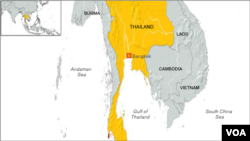Bangkok is sinking.
That is not in dispute. There is no firm consensus, however, on how long the metropolitan area, home to about 10 million people, can remain inhabitable.
The National Reform Council (NRC), under Thailand's junta which runs the country, wants the government to establish a national committee to respond to scientists' warnings that Bangkok could be permanently underwater several decades from now.
In a neighborhood alongside the Saen Saeb canal, built in the late 1830's, there is already a sinking feeling.
The cracks in uneven pavement and sagging walls on homes, small shops and a mosque are testament to an inevitable fate of a waterfront area dropping two centimeters per year, twice the average rate of the rest of the capital.
‘Who will help us?’
“I don't know what to do. Who will help us? I don't know,” said Vijitri Puangsiri, who has lived here all of her 44 years in a home that faces annual repairs due to subsidence.
The towpath in front of her century-old house, where she runs a small restaurant, is also repeatedly in need of maintenance.
“If you take the canal boats you can observe how this is all hollow. The buildings are sinking because they were not constructed on solid foundations,” said Somsak Kongpeeng, a community volunteer and a neighbor of Vijitri's.
Somsak Kongpeeng half-seriously joked during a VOA interview on the towpath that if we returned to see him here again in 20 years, the water level would be up to his shoulders.
That might turn out to be only a bit of an exaggeration in a city with an average elevation of two meters and structures built atop soft clay.
A rising sea level, excessive pumping of groundwater and building so many high-rises are the primary causes of Bangkok's dropping elevation, according to those who have been studying the problem.
But the lucrative construction boom continues unabated, a folly to those sounding the water alarm.
Routine floods
“If we don't do anything, everybody will lose. Because if the land itself is sinking the value of land will also go down,” argued associate professor Sucharit Koontanakulvong, who heads the Water Resources System Research Unit at Chulalongkorn University.
The professor and other members of a panel predict that if no action is taken, repeated and sustained flooding beginning within the next two decades and lasting “two or three months,” would cause Bangkok's economy to grind to a halt.
That was experienced during the 2011 monsoon season, when 13 million people were affected by flooding – more than 800 died – and the economic damage to Thailand exceeded $45 billion, according to the World Bank.
In a July 25 editorial titled “Stop the city sinking,” the Bangkok Post fretted that despite previous flooding experiences and fresh warnings, indifference still seems to prevail.
The newspaper called for halting further expansion of the city, strategic divestment from Bangkok and a complete halt to pumping groundwater.
There are also calls to spend billions of dollars to shore up the frequently flooded capital with seawalls. Even with such a costly effort, nature could still eventually reclaim all man has built in this low-lying swampland in a river delta.









